Nov 3, 2025. Day 4 in Bhutan, Nabji Village in Trongsa, Moving to Thimphu
Hello. Today marks the fourth day of visiting Bhutan. The schedule includes departing from Zhemgang, inspecting projects conducted in Korphu Gewog in Trongsa District, and moving to Thimphu, the capital of Bhutan.
After completing his morning practice and meditation, Sunim prepared to leave the JTS Center. When the Bhutan JTS volunteers bowed three times to greet Sunim, he encouraged them and gave them some pocket money.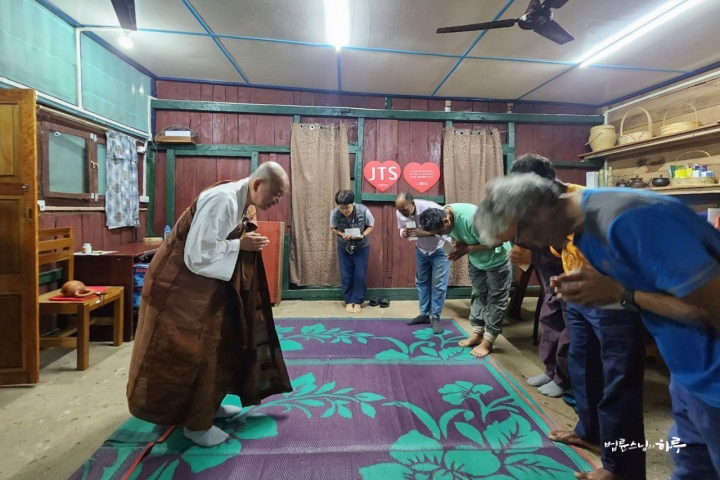
He then talked about the dining table that the volunteers had quickly made for last night’s dinner.
“How did you make such a nice table in just one day? Thank you for your hard work. Please keep the table safe for use at the next event.”
After saying farewell to the JTS volunteers, Sunim departed from Zhemgang at exactly 5 AM. Due to the rain from two days ago, many rocks and soil had collapsed onto the roads in various places.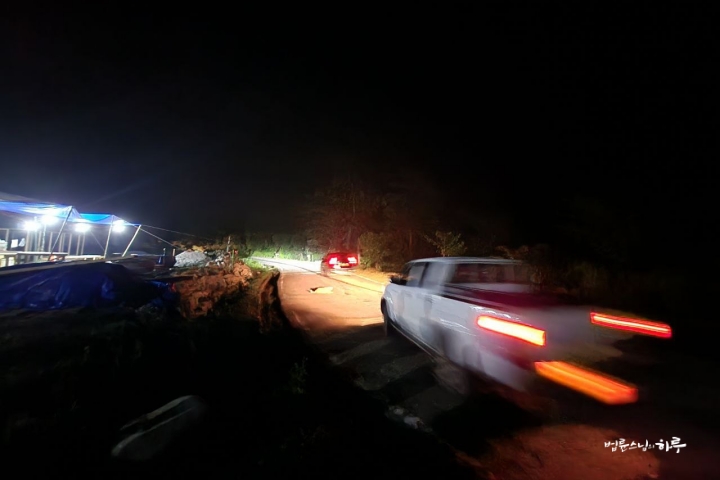
At 7 AM, they arrived at Wangdue and had warm tea and potatoes prepared by the Zhemgang Dzongkhag office. The Deputy Governor of Zhemgang and the Planning Officer joined them to discuss the findings from this visit.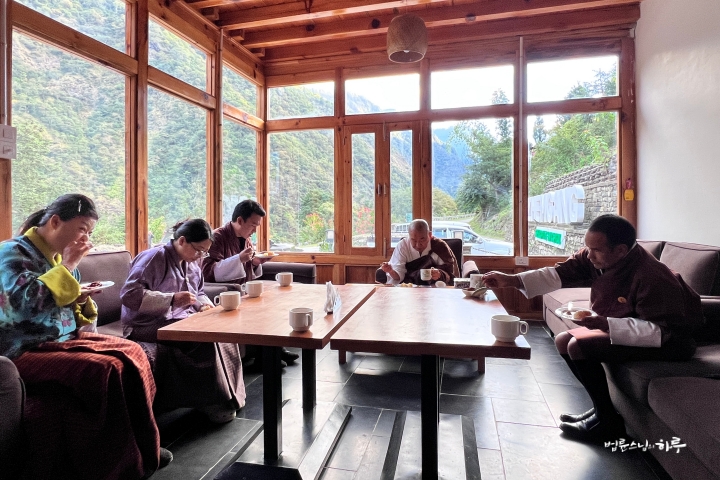
Sunim proposed specific directions for the overall operation of housing and medical support projects in the Zhemgang area, including carpenter wage issues, volunteer operation principles, duplicate support verification problems, criteria for supporting disadvantaged families, and improvements in hearing aid support.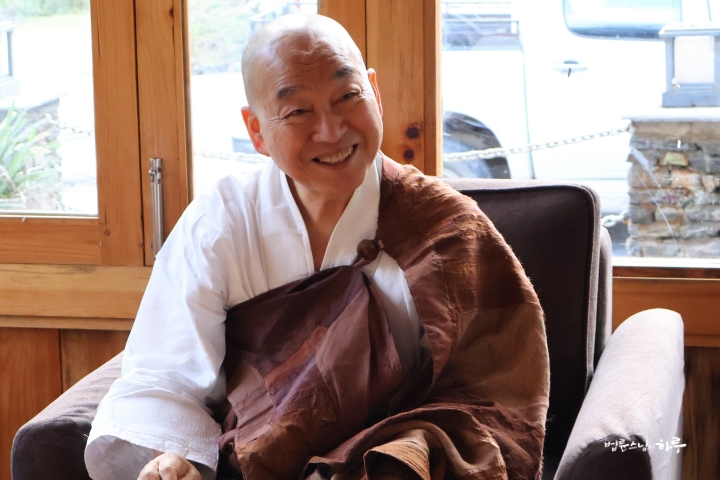
“While maintaining JTS principles, I hope we can be flexible according to local circumstances. When consensus is difficult to reach in the field, let’s explore administrative support measures through consultation with the Governor.” 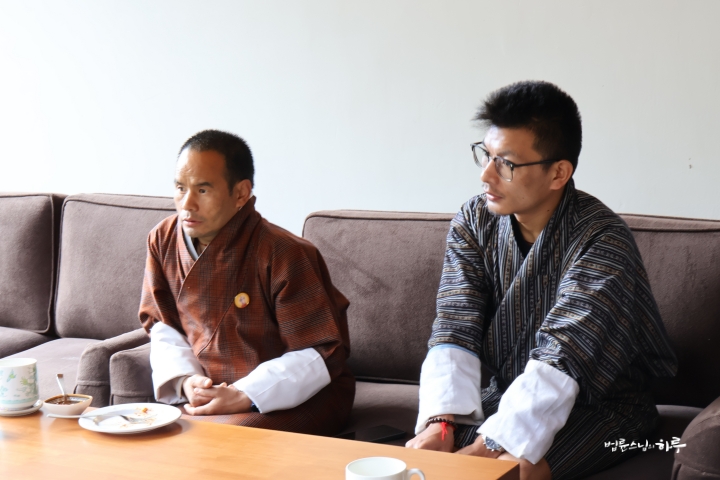
They concluded the meeting with an agreement to further strengthen cooperation between the Bhutanese government and JTS. After thanking the Zhemgang officials who had been with them for the past two days, Sunim moved to Korphu Gewog in Trongsa.
After traveling for an hour on winding mountain roads, they arrived at Nabji village in Trongsa District at 8:30 AM. The Governor of Trongsa and officials from Korphu Gewog warmly welcomed Sunim.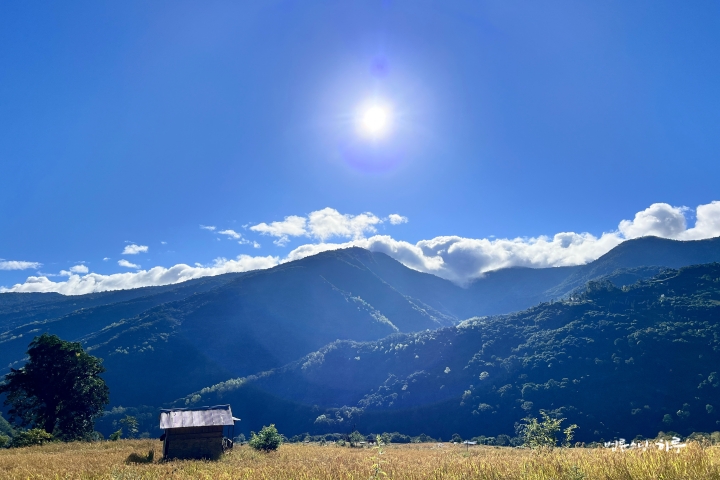
After Sunim entered the temple and paid respects to the Buddha statue, the Tshogpa performed a traditional Bhutanese welcoming ceremony for Sunim.
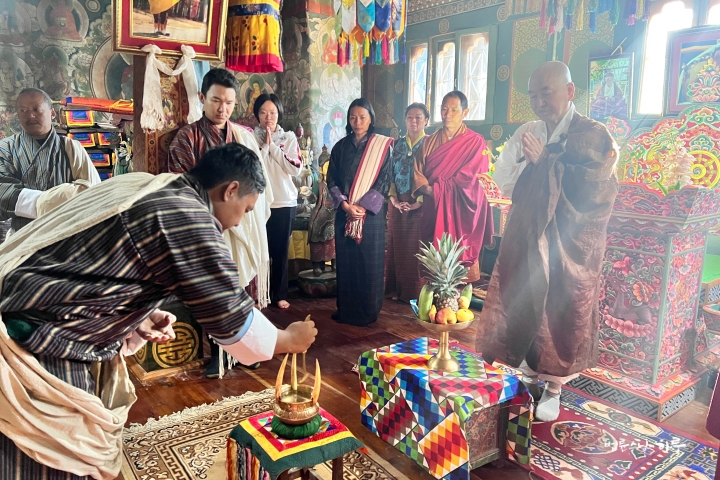
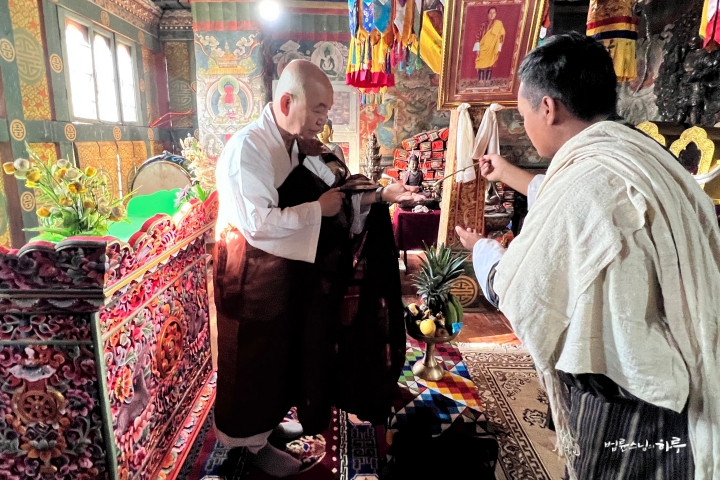
After the welcoming ceremony, they had breakfast with food prepared by the Gewog.
After the meal, Sunim discussed several topics with the Governor of Trongsa. First, they talked about the results of a small-scale Korean rice cultivation experiment. The Korean rice grew very well and discussions even reached the point of purchasing for seed distribution, but just before harvest, rats ate all the rice, causing great disappointment to the farmers. Sunim explained the limitations of Korean rice seeds and emphasized the need for self-production in the long term.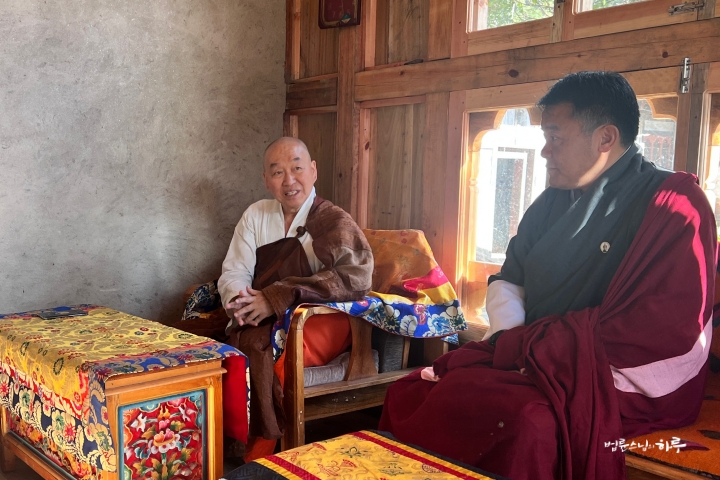
“To sustain this project, it seems difficult to continue bringing Korean seeds every year. Korean seeds are one-time use seeds created through crossbreeding. The first planting increases yield, but quality drops sharply from the second time onward. Even if we start by bringing seeds from Korea initially, we need to enable seed production within Bhutan for the long term.”
The Governor showed deep interest and responded.
“Bhutan has many mountainous areas, so various soil experiments are needed. If we can adapt Korean agricultural technology to our climate, the government will support research at the national level.”
Sunim then told the Governor of Trongsa about his visit to Zhemgang over the past two days for the completion ceremony. He mentioned the problems identified during the field inspection and emphasized the importance of post-completion management.
Building Houses Is Not the End
“This time in Zhemgang, the house-building project for homeless people was carried out without any setbacks, and we successfully completed the ceremony. However, when I went to inspect the site, I found that the project doesn’t end with building houses and holding a completion ceremony. When I visited again after a few months, some houses didn’t have water connections or completed toilets. At first, everyone is happy to have a house, but they continue living in such incomplete conditions. That’s why we must inspect afterward and supplement any deficiencies. Otherwise, people might think it’s finished with the ‘completion ceremony.’ I emphasized this point to both JTS volunteers and Bhutanese officials.”
The Governor nodded in agreement with Sunim’s remarks.
“Due to field circumstances, many think the project is complete when administrative procedures are finished, but true welfare administration requires checking actual living conditions. We will establish a post-inspection system at the local government level in the future.”
In the latter part of the conversation, they had an in-depth discussion about preserving ancient temples in the Trongsa region before concluding their talk.
Next, they inspected the road constructed by villagers in front of the temple in Nabji Chiwog and discussed paving the parking area floor.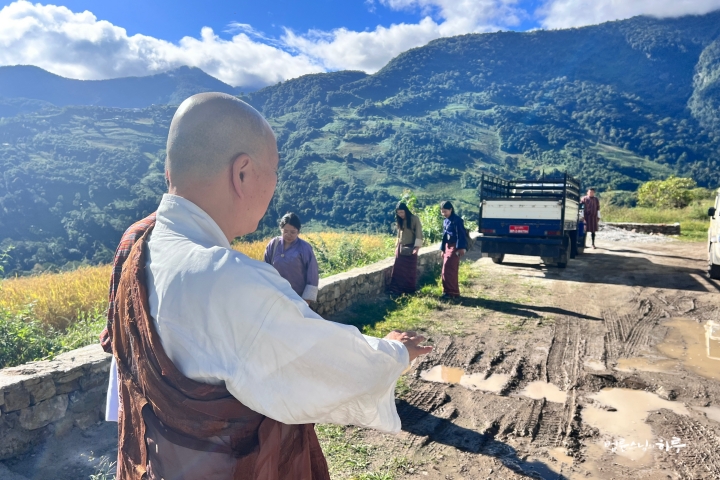
“When paving roads, you need to raise the ground level so water doesn’t pool but drains to the side.”
The temple in Nabji Chiwog is a sacred site where Guru Rinpoche, who spread Buddhism to Bhutan, visited, making it a very important Buddhist holy site in Bhutan. Sunim also made various suggestions to the Governor about developing this temple as a tourism resource.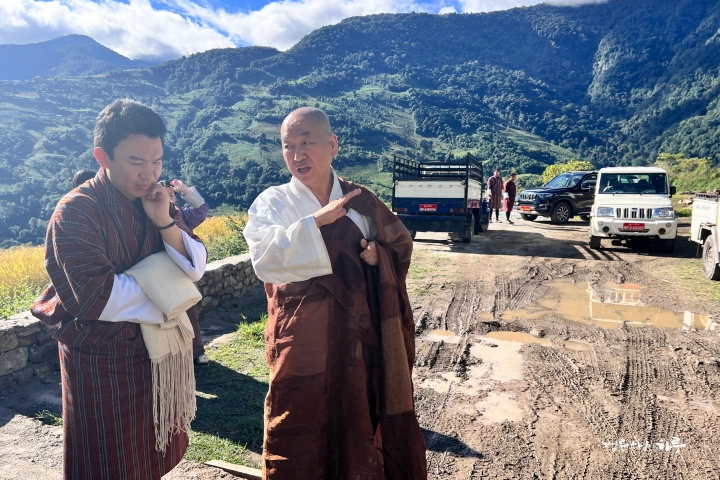
Agriculture and Tourism Must Be Developed Together
“If we turn this into a parking lot and decorate the surroundings with beautiful flower beds, it will become a tourism resource for the village in the long term. Currently, tourists only come for pilgrimage and leave, but in the future, food and accommodation facilities should be prepared together. The scenery here is truly beautiful. To increase both tourism revenue and agricultural production, try planting flowering crops in the rice fields after harvesting rice. This will beautify the landscape, and those plants can also be used as fertilizer or cattle feed.
For empty land, it might be better to plant fruit trees rather than farming. These days, there’s a shortage of people to farm, but young people can certainly manage fruit trees. We need to transform so that farming itself becomes tourism. First, we can welcome pilgrims who visit here; second, the beautiful landscape becomes a tourism resource; and third, we can operate rural experience programs.
Most importantly, there must be something tourists can purchase directly when they come here. We could develop and sell special varieties of rice or agricultural products that can represent this region. We need to research and develop in this direction.”
After inspecting the construction results of the road and parking space in front of the temple, they checked the irrigation channel that was conducted as a pilot project.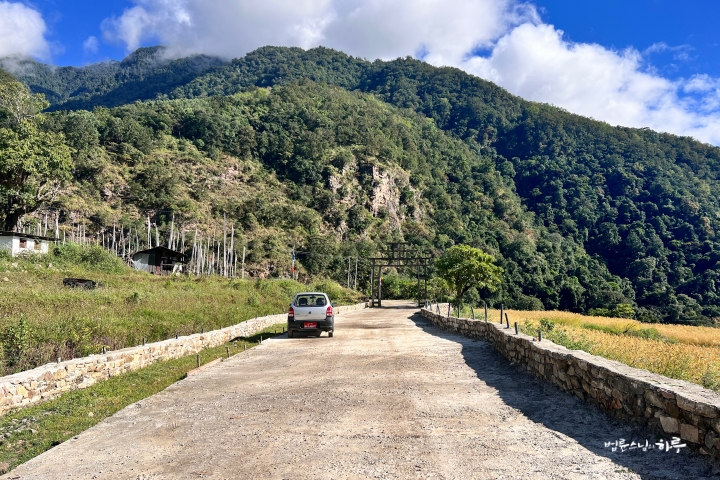
The rice had ripened yellow, turning the fields golden.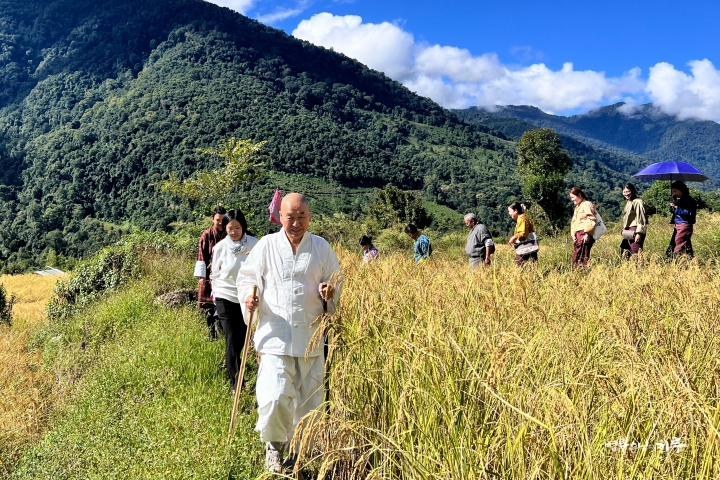
Compared to the initial irrigation channels that were crooked with varying thickness, the recently constructed ones had uniform thickness and height and were neat. Sunim encouraged the hardworking Tshogpa and asked several questions about the residents’ reactions. The Tshogpa answered confidently with a smile.
“The residents have now reached professional level. Wasn’t the work difficult?”
“It was hard carrying all the materials to the construction site.”
“Were the residents happy? Did the harvest increase?” 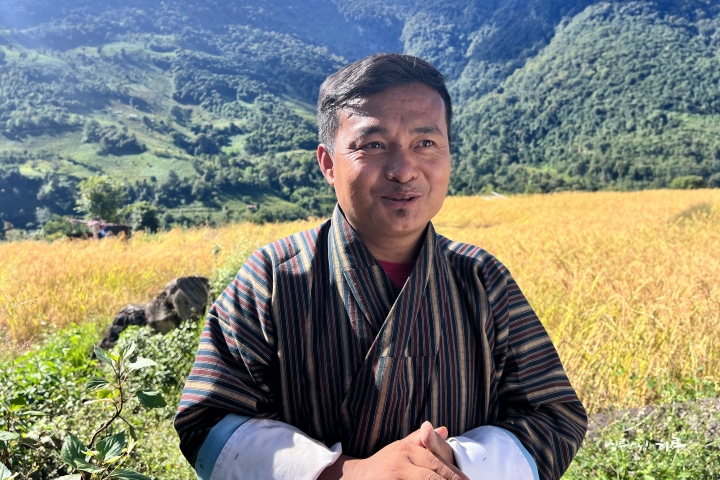
“Yes. The area you just saw had no irrigation channel at all, but after the irrigation construction, water flows well and the harvest has increased significantly.”
“Do you plan to construct irrigation channels for those distant fields too? If the distance is too far, it’s difficult to transport materials, isn’t it?”
“Still, the residents want irrigation channels installed.”
Everyone applauded the hardworking Tshogpa.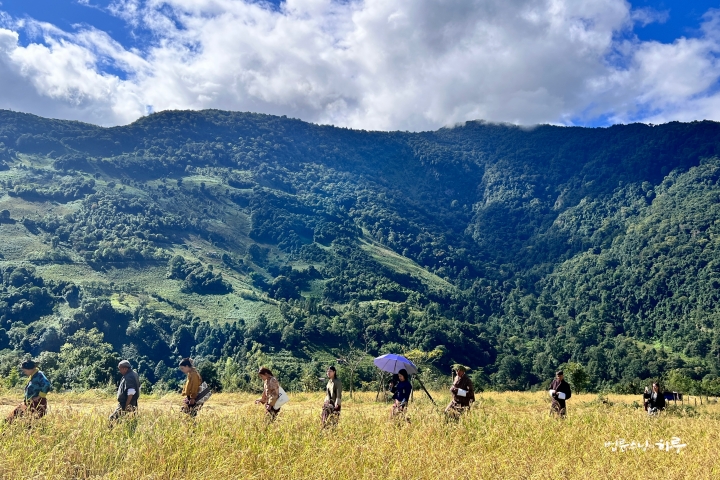
After carefully examining the irrigation construction results, Sunim presented gifts to the Governor and officials of Korphu Gewog.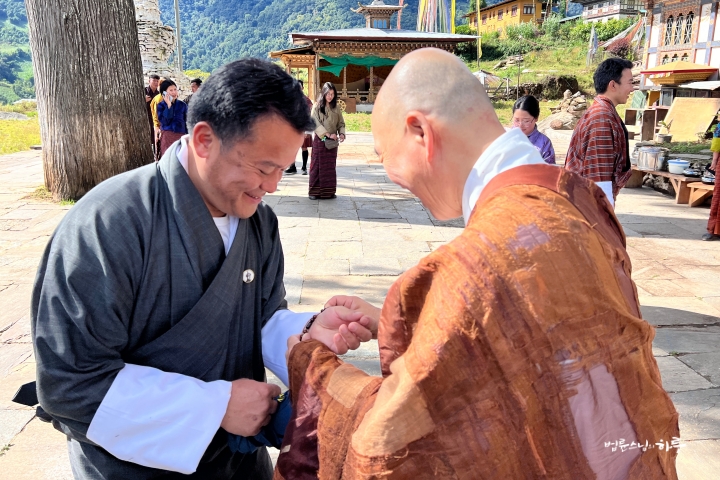
After saying farewell to the Governor, they departed from Trongsa and headed to Thimphu.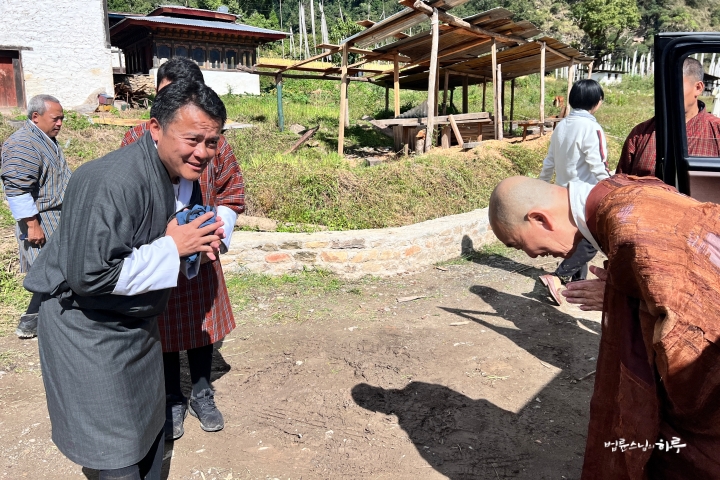
During the journey, they had lunch at a restaurant run by a relative of Rinchen Dawa, who was providing interpretation. The restaurant owner offered dana (food offering) to Sunim, and he expressed his gratitude by presenting a gift.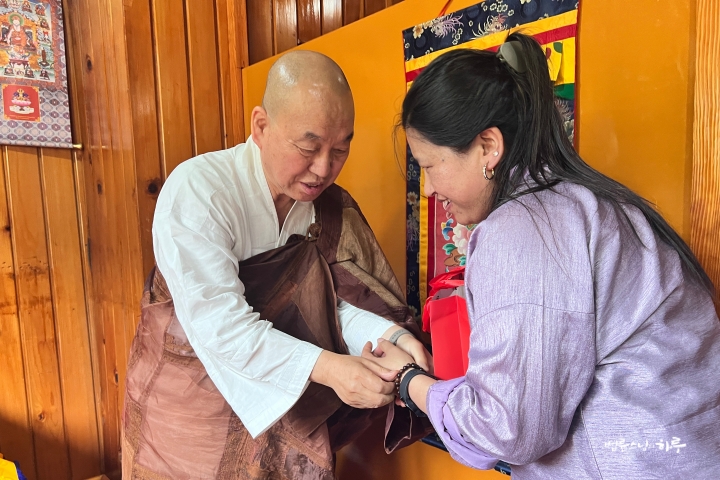
After lunch, they continued traveling toward Thimphu throughout the afternoon.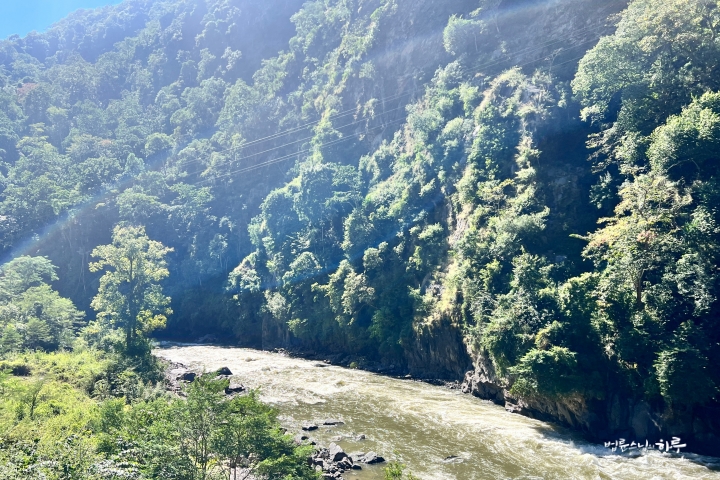
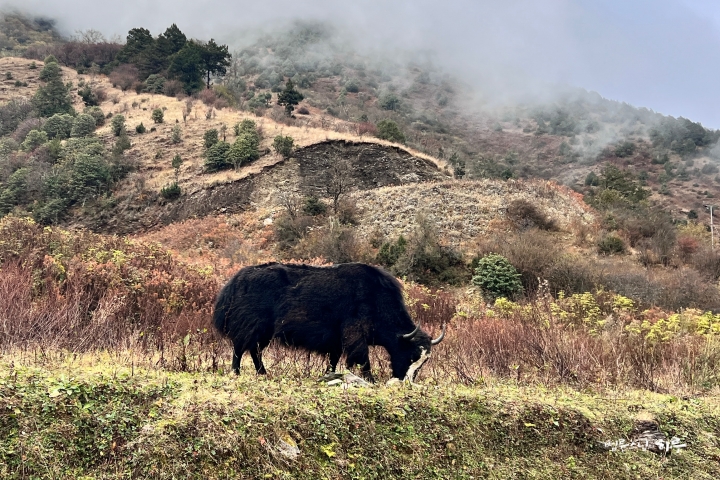
After crossing two mountains over 3,000 meters in altitude, the sun set. At 6:30 PM, they arrived at today’s accommodation, the Bhutan Nuns Foundation, and took an early rest.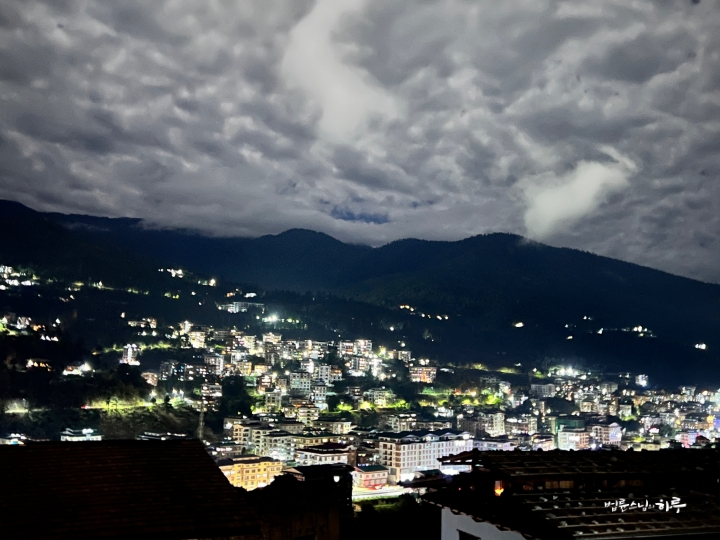
Tomorrow morning, Sunim is invited to attend the opening ceremony of the World Peace Prayer Festival hosted by the King of Bhutan. In the afternoon, he will meet with Dasho Passang Dorji, former Speaker of the Bhutanese Parliament, and then meet with Karma Tshiteem, former Chairman of Bhutan’s GNH Commission.
Since there was no Dharma talk today, I’ll conclude by sharing a dialogue between Sunim and a questioner from a Dharma Q&A held at Ulsan KBS Hall on October 16th, hosted by the International Lions Club.
Is Human Destiny Already Predetermined?
“Some aspects of destiny are predetermined, and some are not. For example, ‘dying within 500 years,’ ‘not growing taller than 5 meters,’ ‘living on Earth until death’ – these are predetermined. There are quite many things that are predetermined like this. ‘Not exceeding 500 kilograms in weight’ is another example. However, what I’ll eat today or whom I’ll marry – these are not predetermined.
There’s something called probability. When you roll a dice, the mathematical probability of getting a 1 is one-sixth. However, rolling six times doesn’t guarantee that 1 will appear exactly once. In reality, when you roll six times, 1 might not appear at all, might appear once, twice, or even all six times. But as you roll the dice ten thousand times, a hundred thousand times, a million times, the probability of getting 1 approaches one-sixth more closely. In other words, as the number of trials increases, the experimental probability converges to the mathematical probability. So, is it more likely that I’ll marry someone I’m dating? Or is it more likely that I’ll marry someone completely different?”
“The person I’m dating.”
“But will you definitely marry the person you’re dating? Are there cases where you don’t marry? Just because the probability is high doesn’t mean you’ll definitely marry. Then, is it absolutely impossible to marry someone you’re not dating? Or could you sometimes marry them?”
“I could marry them.”
“That’s right. The probability of marrying someone you’re dating is somewhat higher, and the probability of marrying someone you’re not dating is somewhat lower. For example, if you majored in nursing, the probability of becoming a nurse is highest, and the probability of not becoming a nurse is just a bit lower. We can’t say someone’s destiny is predetermined based on this. In the past, weather forecasts said ‘It will rain tomorrow’ or ‘It won’t rain,’ but nowadays they express it as probability: ‘There’s a 70% chance of rain tomorrow.’ So, is the probability high or low that a married couple will die at the same time on the same day?”
“Low.”
“Most couples have a much higher probability of dying separately. Just because the probability of dying at the same time on the same day is low doesn’t mean it has special significance. Mathematically speaking, just as there are definitely people who win the lottery, such things can happen. The word ‘coincidence’ is used when we don’t know the cause, and when we know the cause, we call it ‘inevitable.’ In the end, coincidence and inevitability are just differences in whether we know or don’t know. For example, when we say ‘we met by chance,’ it’s because we didn’t expect the meeting, so we call it coincidence. When we say ‘our meeting was inevitable,’ it’s because we already expected to meet. In other words, some things happen by chance in the world, and some things happen inevitably. Because we cannot know the causes of everything in the world, we call what we know inevitable and what we don’t know coincidence.”
“Is there really no predetermined destiny?”
“There are predetermined destinies too. For example, it’s already determined that humans cannot live more than 500 years. Let’s say someone prophesies, ‘If you go that way, you’ll fall off a cliff and die.’ If the person who hears this takes a detour to avoid dying, the prophecy will be wrong. But if they really die as prophesied, what meaning does it have that the prophecy was correct? In the end, it doesn’t mean much to debate whether a prophecy was right or wrong. The truth is, the reason we concern ourselves with destiny is because of greed. It’s like wandering around trying to get something for free.
We have a proverb that says, ‘People do the work, but heaven accomplishes the will.’ This doesn’t mean that God determines the results. In modern terms, it means doing your best without being attached to the results. You just need to do what you have to do. If your destiny is predetermined, then squirrels, deer, and insects must all have predetermined destinies too. But why do we think only humans have predetermined destinies?
Think back to your school days. Sometimes you studied hard for exams but your grades dropped, and sometimes you barely studied but got good grades. So is this predetermined destiny? On average, if you study hard, you’re more likely to get good grades, and if you play around, you’re less likely to get good grades. But there are exceptions. Sometimes you play around and still get good grades, and sometimes you work hard but don’t get good grades. At such times, you might think it’s destiny. Good people may face disasters, and bad people may prosper. However, looking at society as a whole, on average, diligent people do well and lazy people don’t. It’s just that there are exceptions when we look at individuals. Do you understand now?”
“Yes, I understand well. Thank you.”





